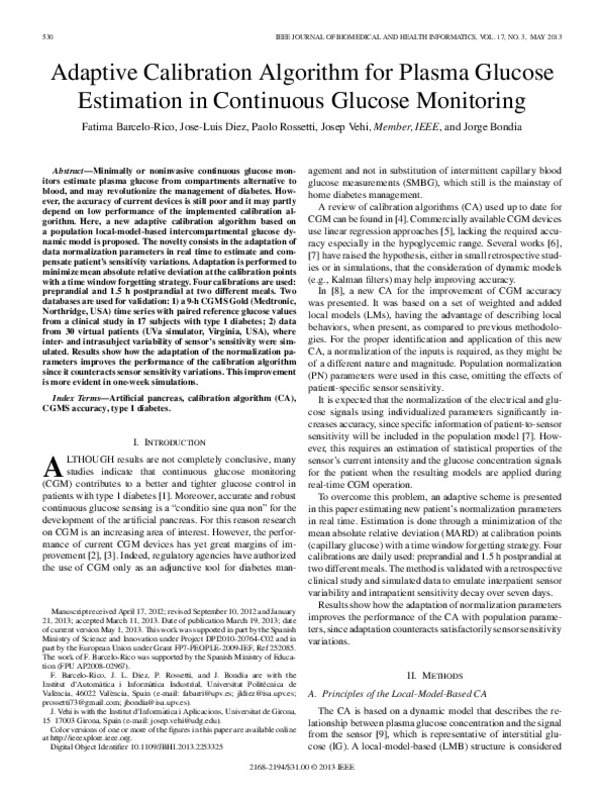Barceló-Rico, F.; Diez, J.; Rossetti, P.; Vehi, J.; Bondía Company, J. (2013). Adaptive calibration algorithm for plasma glucose estimation in continuous glucose monitoring. IEEE Journal of Biomedical and Health Informatics. 17(3):530-538. https://doi.org/10.1109/JBHI.2013.2253325
Por favor, use este identificador para citar o enlazar este ítem: http://hdl.handle.net/10251/136404
|
Título:
|
Adaptive calibration algorithm for plasma glucose estimation in continuous glucose monitoring
|
|
Autor:
|
Barceló-Rico, Fátima

 Diez, José-Luís
Rossetti, Paolo
Vehi, Josep
Diez, José-Luís
Rossetti, Paolo
Vehi, Josep

 Bondía Company, Jorge
Bondía Company, Jorge
|
|
Entidad UPV:
|
Universitat Politècnica de València. Departamento de Ingeniería de Sistemas y Automática - Departament d'Enginyeria de Sistemes i Automàtica
|
|
Fecha difusión:
|
|
|
Resumen:
|
[EN] Minimally or noninvasive continuous glucose monitors estimate plasma glucose from compartments alternative to blood, and may revolutionize the management of diabetes. However, the accuracy of current devices is still ...[+]
[EN] Minimally or noninvasive continuous glucose monitors estimate plasma glucose from compartments alternative to blood, and may revolutionize the management of diabetes. However, the accuracy of current devices is still poor and it may partly depend on low performance of the implemented calibration algorithm. Here, a new adaptive calibration algorithm based on a population local-model-based intercompartmental glucose dynamic model is proposed. The novelty consists in the adaptation of data normalization parameters in real time to estimate and compensate patient's sensitivity variations. Adaptation is performed to minimize mean absolute relative deviation at the calibration points with a time window forgetting strategy. Four calibrations are used: preprandial and 1.5 h postprandial at two different meals. Two databases are used for validation: 1) a 9-hCGMSGold (Medtronic, Northridge, USA) time series with paired reference glucose values from a clinical study in 17 subjects with type 1 diabetes; 2) data from 30 virtual patients (UVa simulator, Virginia, USA), where inter-and intrasubject variability of sensor's sensitivity were simulated. Results show how the adaptation of the normalization parameters improves the performance of the calibration algorithm since it counteracts sensor sensitivity variations. This improvement is more evident in one-week simulations.
[-]
|
|
Palabras clave:
|
Artificial pancreas
,
Calibration algorithm (CA)
,
CGMS accuracy
,
Type 1 diabetes
|
|
Derechos de uso:
|
Reserva de todos los derechos
|
|
Fuente:
|
IEEE Journal of Biomedical and Health Informatics. (issn:
2168-2194
)
|
|
DOI:
|
10.1109/JBHI.2013.2253325
|
|
Editorial:
|
Institute of Electrical and Electronics Engineers
|
|
Versión del editor:
|
https://doi.org/10.1109/JBHI.2013.2253325
|
|
Código del Proyecto:
|
info:eu-repo/grantAgreement/EC/FP7/252085/EU/Seeking solutions for the artificial pancreas: new methods for improving continuous glucose monitoring and closed-loop postprandial glycaemic control./
info:eu-repo/grantAgreement/MICINN//DPI2010-20764-C02-01/ES/NUEVAS ESTRATEGIAS DE CONTROL GLUCEMICO POSTPRANDIAL MEDIANTE TERAPIA CON BOMBA DE INSULINA EN DIABETES TIPO 1/
info:eu-repo/grantAgreement/MICINN//AP2008-02967/ES/AP2008-02967/
|
|
Agradecimientos:
|
Manuscript received April 17, 2012; revised September 10, 2012 and January 21, 2013; accepted March 11, 2013. Date of publication March 19, 2013; date of current version May 1, 2013. This work was supported in part by the ...[+]
Manuscript received April 17, 2012; revised September 10, 2012 and January 21, 2013; accepted March 11, 2013. Date of publication March 19, 2013; date of current version May 1, 2013. This work was supported in part by the Spanish Ministry of Science and Innovation under Project DPI2010-20764-C02 and in part by the European Union under Grant FP7-PEOPLE-2009-IEF, Ref 252085. The work of F. Barcelo-Rico was supported by the Spanish Ministry of Education (FPU AP2008-02967).
[-]
|
|
Tipo:
|
Artículo
|









